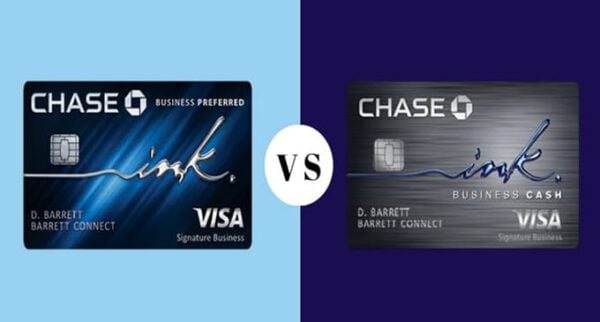The American Express Blue Business Cash™ Card review
This card features an easy-to-understand cash-back rewards structure that will have your small business enjoying 2% cash back on eligible purchases, up to $50,000 spent in a calendar year, and then 1% thereafter.
Jump to Section
card_name
- Rewards
- points_per_dollar
- Welcome Bonus
- bonus_miles bonus_miles_disclaimer
- Annual Fee
- annual_fees
Key Features
descriptionEditor Analysis:
- Earn 2% cash back on all eligible purchases on up to $50,000 per calendar year, then 1%. A $50,000 annual spend cap on bonus rewards is quite good for a card with no annual fee.
- Your business needs are always changing, and therefore, your spending habits might often change too. This card offers Expanded Buying Power, which allows you to spend beyond your credit limit. Just remember, the amount you can spend above your credit limit is not unlimited. It adjusts with your use of the card, your payment history, and credit record.
- Take advantage of 0% intro APR on purchases for 12 months, then RegAPR. See Rates and Fees
- The $50,000 annual spend cap on bonus rewards is quite high, but if you see yourself spending beyond this each year, a card with no spending cap might be a better fit. Even if it has an annual fee, if you're using the card often enough, offsetting the fee likely won't be too hard.
CardName is kind of like the perfect dinner guest. It doesn’t suck up the life of the party by being too flashy and ostentatious but also isn’t a bore either. In other words, it has a straight-forward cash-back plan and no annual fee, and you won’t be embarrassed that you invited it into your wallet. American Express is a CardRatings advertiser. See Rates and Fees.
That said, if you’re looking for creative ways to get points and cash back, and you do a lot of traveling for your business, this may not be your card. But if you’re starting a business or are an established business owner, and you just want to earn cash back on your purchases, and to heck with those rotating categories that some rewards cards have, we’ll lay out a case for why you may be interested in CardName.
card_name benefits
There are a number of appealing benefits with this card. In a nutshell:
- No annual fee
- Earn a signup_reward statement credit after you make signup_bonus_spend_amount in purchases on your card in your first three months.
- A straight-forward cash-back plan— you’ll get 2% cash back on your first $50,000 in purchases each year, and then 1%, and the cash you earn is automatically credited back to your statement
- Intro 0% APR on purchases for 12 months, then RegAPR
- Car rental loss and damage insurance
- Expense management tools
- Free employee cards
- Expanded buying power— gives you the freedom to spend beyond your credit limit; just remember, the amount you can spend is not unlimited and adjusts with use of your card, your payment history and credit record
- See Rates and Fees
card_name foreign transaction fees
This is worth discussing, because on foreign purchases, this card charges foreign_fee Though that’s better than many card’s 3% fee, there are cards that don’t have any foreign transaction fees, which could be better for frequent international travelers. See Rates and Fees.
Let’s say that you jet off to Australia, and you spend $8,000 on CardName. That 2.7% foreign transaction fee means you’ll spend an extra $216 on the trip. So you’ll really end up spending $8,216. Now, of course, the 2% cash back offer would actually mean you’d earn $160 off that $8,000 (assuming you haven’t met the annual $50,000 spend threshold yet), so you could look at it as though you’re actually spending an extra $56 on the trip and not $216, but still, it’s something to think about.
If you or your employees travel abroad often, you might want to consider a card with no foreign transaction fee, such as the CardName (compared below). The trade off is that the Chase card charges an annual fee, but it also offers a huge welcome bonus as well as a plethora of travel benefits to help offset that.
If you simply don’t travel much, and your financial life isn’t very complicated, you may not care about the foreign transaction fee and welcome CardName‘s simplicity.
card_name potential downsides
Just as there are a number of appealing benefits with this card, there are some potential negatives. You’ve probably caught wind of all or most of them if you’ve read through this so far, but just to recap, what you may not love about the card includes…
- A $50,000 annual spending cap on bonus rewards. If your business spends a ton every year, and each month, it may disappoint you that the 2% cash-back rate ends after reaching $50,000. So if you typically spend well over $4,100 a month, you may want a different card. That said, you still get 1% cash back after the $50,000, and that isn’t limited.
- A foreign_fee foreign transaction fee. As we covered above, this fee likely isn’t ideal for frequent international travelers; however, it probably won’t be a big deal if you don’t travel abroad often or don’t shop with overseas vendors in foreign currency.
card_name approval odds
Do you qualify for CardName? Since you don’t necessarily need an Employer Identification Number (EIN) to qualify for a business credit card, your chances could be higher than you might think.
To qualify for a business credit card, you must be your company’s "authorized officer." Basically, this means that you must have the legal right to enter into borrowing arrangements with financial institutions on behalf of a business. If you are the owner of a sole proprietorship business or the sole owner of a small business, you are already an "authorized officer."
It can be more complicated determining who ranks for businesses that have multiple owners. In general, though, most owners are also "authorized officers." Credit card issuers consider each application on its own merits, so don’t assume you don’t qualify just because your business might not fit that standard business model. Do keep in mind though that your personal credit history will likely be what is used to determine your eligibility and/or credit limit on a business card before you’ve built up a credit history for your business.
If your business doesn’t have a tax ID number (EIN), you can enter your personal social security number instead. In general, try to have the following information handy when you apply:
- Business name
- Business name as you want it to appear on the card
- Business address
- Type of business
- Tax ID number (or your social security number)
- Number of employees
- Annual revenue/sales
- Monthly expenses
- Number of years in business
- Ownership type (publicly traded, privately owned, etc.)
- Business structure (LLC, corporation, non-profit, etc.)
Learn more about how to apply for a small business credit card.
How card_name compares to other cards
CardName vs. CardName
discontinued
CardName is fairly different from the CardName, but they can both be great fits for different types of credit card users.
To start, the CardName has an annual fee, whereas CardName does not. That said, Chase’s annual fee is pretty small as annual fees go– AnnualFees. There’s also a nice welcome bonus of 90,000 points once you spend $8,000 on the card in the first three months of opening the account. This bonus can be worth as much as $1,125 in travel when redeemed through Chase Travel℠, which is plenty to offset the annual fee for years to come.
The CardName also has a more robust rewards program than CardName. The Chase card offers three points per dollar on the first $150,000 spent on travel and other select business categories each account anniversary year, and one point for every $1 spent on everything else. Points can then be exchanged for cash transfers, gift cards or, for 25% more value, can be redeemed towards airfare, hotels, car rentals and cruises through Chase Travel.
That can really save a cardholder money, but it’s a lot to remember, which is why some people might prefer 2% cash back on purchases up to $50,000 and then 1% cash back from there on out like with the American Express card. Pretty simple.
There is no foreign transaction fee with the CardName; CardName charges foreign_fee
CardName vs. CardName
discontinued
This Chase card offers a hefty welcome bonus to new cardholders even though the spending threshold is high. New CardName holders can earn a $350 once spending $3,000 on purchases in the first three months, and an additional $400 once spending $6,000 on purchases in the first six months of opening an account.
As far as ongoing rewards go, the CardName earns 5% cash back on the first $25,000 spent in combined purchases at office supply stores and on internet, cable and phone services each account anniversary year; 2% cash back on the first $25,000 spent in combined purchases at gas stations and restaurants each account anniversary year; and 1% cash back on all other card purchases with no limit to the amount you can earn.
That may work out better for many CardName cardholders, especially those who spend heavily on office supplies and communications costs, whereas some might just appreciate the simplicity of CardName‘s cash back program: 2% cash back on purchases up to $50,000 annually, and then unlimited 1%.
One notable similarity between these two cards is that neither charges and annual fee, so they could both be great options for anyone looking for a no-annual-fee card to use, or to use as a secondary option to other cards.
Also worth noting are foreign transaction fees. The CardName (unlike the CardName, which has no fee) has a foreign_fee fee. CardName charges foreign_fee
Is card_name a good card?
Absolutely, but it depends what your interests are. If you travel a lot for business, and you want rewards for that, this probably is not your card, especially because of the foreign transaction fee.
If you want a straight-forward reward program that allows you to earn cash back, without worrying about rotating categories or tiers, or an annual fee, this is a great option to consider.
Frequently asked questions
Is it hard to get card_name?
What is the credit limit for card_name?
Disclaimer:The information in this article is believed to be accurate as of the date it was written. Please keep in mind that credit card offers change frequently. Therefore, we cannot guarantee the accuracy of the information in this article. Reasonable efforts are made to maintain accurate information. See the online credit card application for full terms and conditions on offers and rewards. Please verify all terms and conditions of any credit card prior to applying.
This content is not provided by any company mentioned in this article. Any opinions, analyses, reviews or recommendations expressed here are those of the author’s alone, and have not been reviewed, approved or otherwise endorsed by any such company. CardRatings.com does not review every company or every offer available on the market.
See Rates and Fees for CardName










